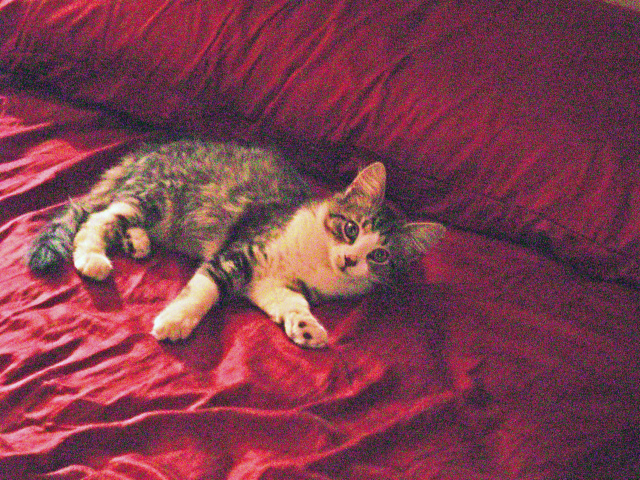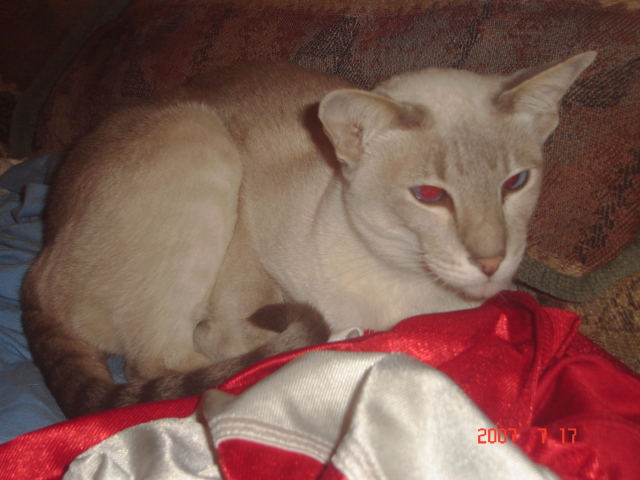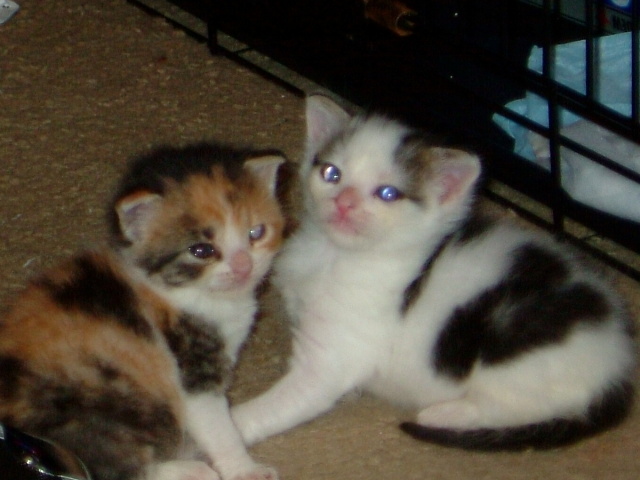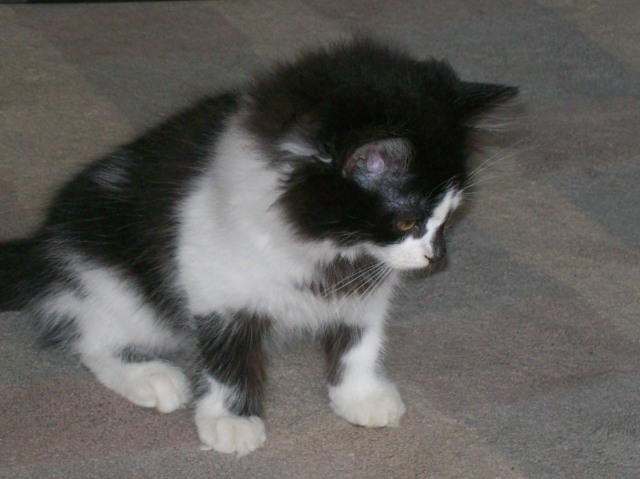QuestionSorry for the lengthy letter, but I do want you to have all of the details as described in your instructions)
Dear Tina Noyes,
I'm usually hear to answer questions (Dale B - disease/alcoholism) :-) but here I am in big trouble . . . I think.
A friend of mine who lives in the country has two dogs she has owned for about three years. She has a little "dog door" for them to get into the fenced in yard. There has been a female cat - about 4 years old who also uses this door to eat the dog food from time to time or when the weather is extremely cold. Her dogs are afraid of this cat. So is everything and everyone else.:-) She had a litter of kittens inside the house this winter. One of the dogs killed the whole litter while she was out hunting. No one can approach this cat.
Tonight . . . I trapped it with a live trap that my friend at the animal shelter lended me. After looking at the cat he said it was too wild/mean - and needed destroyed. It was tearing itself up trying to get out of the rather large cage. (18" X 18" X 36") I called a vet that I use to take my ferrets to, whom I respect much and he gave me pretty much the same reply as the animal shelter -destroy it.
So . . . I took the cat home. I have no other pets at this time, and live by myself. I put the caged cat in my bathroom - size about 6'X 7'X 9'). I opened the window (it's up high) for fresh air, gave it a bowl of fresh water, and a bowl with some of the same food it had been stealing from the dogs. :-) I also put some newspaper in one corner which I suspect is asking too much from a wild cat.
I reinstalled a "gate" that I had once used for my ferrets so it couldn't escape the bathroom, and very slowly and carefully opened the live trap cage. The cat just layed there in the cage for 20 minutes. I dimmed the lights and left. If flew out of the cage and has hid under the sink since. (About 7 hours). No eating or drinking yet.
The cat seems to be in great health. Average weight, dry nose, clear eyes, I'm guessing sharp teeth. :-) I'm sure it needes wormed, vaccinated, cleaned for fleas, tics, etc, but who and how? The vet can't get close to it. I can't either.
The questions:
Is it your experience that this type of cat will starve itself to death?
Is it possible to "tame" or "house/home break" an older, wild cat?
What should I be doing or avoid doing . . . anything?
It may sound really dumb, but this cat reminds me of me. At one time everyone gave up on me and my chance of recovering from alcoholism, and there's a few too - who would rather have me put to sleep. :-)
Any advice would be greatly appreciated. Any tips. And the truth . . . even if it hurts.
Thank-you in advance for your time, and also for volunteering here.
************************************************
Ps. Check out my AA "Home Group" page if you get a break. http://old47.tripod.com
Love and Peace - Dale B.
AnswerHi Dale,
Well this is one lucky kitty that she has found you in an area that sounds unwilling to give her (or maybe anyone) a chance! I can see how you would identify with this kitty and I think you're right - these things are all about people's expectations and tendancy to give up immediately versus giving someone a chance and the opportunity to find love.
If you are willing to give her this chance and spend some time with her, I think you will find it rewarding. I have worked with hundreds of feral adult cats. Due to space and time constraints, many of these are spayed/neutered, vaccinated and released back where we found them to be fed daily by volunteers and live a feral life. But whenever I can, I give these cats a chance at an easier life. I have successfully "tamed" dozens of adult feral cats. I don't think it's any special skill of mine except empathy and patience, but most of these cats once they figure out what the easy life is they embrace it. Of course this cat is afraid of humans - for one thing we are 10x gher size, and last time she brought her kittens in a house where she thought she'd be safe, they were attacked and killed - so she has bad memories of houses and human smells!
Some of the friendliest, loving cats I know were once feral. My own cat Emma was a feral momma found with 3 kittens. We found homes for the kittens right away and I had Emma spayed, and held her in confinement for a while to see how she'd react. She couldn't be handled or approached at all and was completely like a wild animal for about 3 months. THen one day, literally almost overnight, she changed her mind. She meowed to me and let me rub her cheek. Now she follows me around the house, sleeps on my feet at night and begs for attention! She also adores my 2 male cats and grooms them and plays with them. Every time she looks up at my and gives her adorable meow, I remember that people at the vet clinic recommended I release her and never see her again because she was "too wild". Few things are more rewarding (as you know from your line of volunteer work) than turning a life around and knowing that you played a role in that.
I've also adopted formerly-feral adult cats into loving homes through Stanford Cat Network. I believe that pretty much any feral cat given enough time and patience will become tame enough to live comfortably in a home. Of course they all have different personalities, and some cats may become loving lap cats while others will just want to be left alone most of the time. But isn't that OK too? You can't require love of another creature, and house life is certainly a much nicer life than scrounging for food and dodging the predators outside and getting pregnant year after year only to lose the kittens to disease, predators and other dangers. She certainly does not deserve death just because she is afraid of humans, at the worst you can find a way to get her spayed and vaccinated, release her outside and leave food for her. Chances are, however, that you can surprize everyone who condemned this cat just because she is afraid of humans - in a year I bet they will not regignize her!
The first thing you need to do is find a vet who will spay her and vaccinate her, check her over. Our vet does this by injecting a sedative through the cage, then taking the cat out using expert handling techniques, and applying the anesthetic gas mask. THen an exam, spay and any other treatment needed is performed under anesthetic. It sounds like a vet that has experience doing this could be very hard to find in your area, where do you live? You can look to the following organizations for a feral cat vet & spay clinic in your area. Alley Cat Allies Feral Friends Network http://www.alleycat.org/feral_friends.html can help you find allies in your area, and Best Friends Animal Sanctuary in Utah has a spay/neuter clinic and may be able to help you as well http://www.bestfriends.org I hope there is someone you can turn to!
Spaying her will ensure that if she esccaoes your house she is free of the burden of endless pregnancy and birth which feral cats are subject to, and it may also make her calmer and tamer. If you can arrange to have her visit the vet within the next few weeks to get it over with it would probably be best... but make sure she eats and goes to the bathroom before any more stressful trips. you may have to trap her again to get her to the vet unfortunately! If you can't trap her without withholding food wait until she is eating regularly.
If trapping her again inside your house doesn't seem to be an option and/or you can't find a vet that will treat her when she is completely feral, you may have to wait a month or so until she calms down more. Cats won't normally starve themselves to death but it can be dangerous for them to go more than 2 days without food. Leave out some tempting smelly canned food at night to entice her appetite and try to leave her alone for a couple of days.
By the way, dog food is not sufficient for cats - it is deficient in the amino acid taurine, whcih dogs and humans can synthesize but cats - as obligate carnivores - can't. Cat foods contain more protein and meat and other sources of taurine. It won't harm her to eat some dog food for a few days but a sustained diet will cause heart failure and blindness. When you can, get to the store and get some cat food.
Keep her confined to a small space in your home, like a small bedroom bathroom or a large cage as it sounds like you have done. You want her someplace she can feel safe but not run away and hide completely. I know people who have had success by putting the cat in a large cage in thei living room where they are able to see all the humans activities and get used to them. It sounds mean to put a feral animal in a cage but most of them actually seem to appreciate the safe feeling after a few days. However if they spend too long in a cage they can start to get agorophobic and be afraid of open spaces when they come out. If you use a room just make sure you can visit frequently because the more time you spend near her, even just watching TV or reading a book, the more used to human presence she will get. Don't let her loose in your house, because she'll just hide and avoid you and also may go to the bathroom in spots you will find later! Keeping her confined for months is just fine, she will adapt.
Provide a litterbox with cat litter - must feral cats will actually use it automatically because they want to dig and bury their business. If sh doesn't take to it right away, try adding a handful of dirt from outside for the smell. I find most cats prefer unscented litter with a texture ilke sand, try a clumping cat litter or plain clay litter. Newspaper will not be rcgnized as a toilet spot although she may try to bury her business with whatever loose covering (newspaper or beddins) she can find.
Provide some hiding spots like a cardboard box cat sized holes in 2 sides (cats like an escape route) and some soft bedding. Try to ensure there are no spots she can hide that you can't see her or reach her (not that you should try to touch her right away). Leave out food and wter at all times, preferably under a table or somewhere she feels less exposed and therefore more confident. She will probably start to eat at night when all is quiet an she feels safer.
I have a brief article written at http://catnet.stanford.edu/articles/socializing_ferals.html
that provides some more tips on socializing feral cats. It's especially important when you start making attempts to touch the cat. Usually the best time is whil the cat is eating. I even know one couple who tamed their feral cat by smearing tuna juice on their hands and getting the cat to lick it off!
Feel free to contact me again for further advice!
-Tina

 Additional info about the possbile norwegian
Question
Edmund at 4 months
I forgot to mention. Edmund
Additional info about the possbile norwegian
Question
Edmund at 4 months
I forgot to mention. Edmund
 Siamese tracks feces around the house
Question
Dirty Foot
I recently adopted a wonderf
Siamese tracks feces around the house
Question
Dirty Foot
I recently adopted a wonderf
 Worried that my cat has a UTI??
Question
Oscar
Hello,
My name is Danielle and I have t
Worried that my cat has a UTI??
Question
Oscar
Hello,
My name is Danielle and I have t
 2 Ferals
Question
Sister and Brother at
Hello!
Im so glad I fo
2 Ferals
Question
Sister and Brother at
Hello!
Im so glad I fo
 handling my 9 week ferel kitten
QuestionMillie
QUESTION: Hi. My lovely 9 week ki
handling my 9 week ferel kitten
QuestionMillie
QUESTION: Hi. My lovely 9 week ki